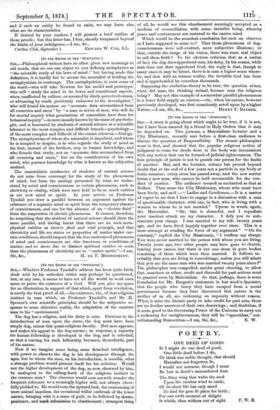[TO THE EDITOR OF THE "SPECTATOR."]
SIR,—Philosophical writers have so often given new meanings to old words, that no one can object to you defining metaphysics as "the scientific study of the laws of mind ;" but having made this definition, it is hardly fair to accuse the naturalist of holding the metaphysician in contempt. The metaphysician, in your sense of the word—who will take Newton for his model and prototype, who will "study the mind in its lower and transitional aspects, when unaffected by culture, or arrested by dimly-perceived causes, or advancing by- roads previously unknown to the investigator," who will found his system on. "accurate data accumulated from all countries and races" by "a man or series of men, who will do for mental inquiry what generations of naturalists have done for botanical inquiry"—is more usually known by the name of psycholo- gist, and is honoured by students-of natural science as a scientific labourer in the most complex and difficult branch—psychology- of the most complex and difficult of the extant sciences,—biology. The metaphysician of whom the naturalist is impatient, and whom he is tempted to despise, is he who regards the study of mind as the first, instead of the furthest, step in human knowledge, and who founds that study, not on "accurate data accumulated from all countries and races," but on the consideration of his own mind, who pursues knowledge by what is known as the subjective method.
The materialistic tendencies of students of natural science do not arise from contempt for the study of the phenomena of mind, but from the analogy presented by what we under- stand by mind and consciousness to certain phenomena, such as electricity or vitality, which were once held to be as much entities as are now mind or spirit. In your article on Professor Tyndall you draw a parallel between an argument against the existence of a separate mind or spirit from the temporary absence of consciousness, and one for the absence of an "electric fluid" from the suspension of electric phenomena. It cannot, therefore, be surprising that the student of natural science should draw the same parallel, and having learnt that there are no such meta- physical entities as electric fluid and vital • principle, and that electricity and life are states or properties of matter under cer- tain conditions, should suspect that the less understood phenomena of mind and consciousness are also functions or conditions of matter, and no more due to distinct spiritual entities or souls than the phenomena of electricity are to "amber sprite."--I am,






























 Previous page
Previous page